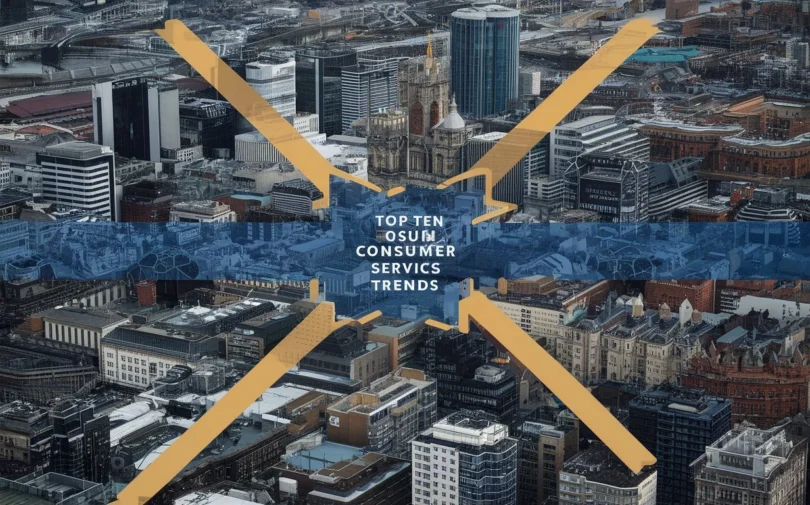In an ever-evolving marketplace, understanding the latest trends in consumer services is crucial for businesses aiming to stay competitive, particularly in the UK. As technology advances and consumer preferences shift, companies must adapt quickly. This article explores the top ten trends currently reshaping the top Ten consumer services landscape across the United Kingdom, offering insights into how businesses can leverage these trends for growth and success.
Trend 1: Increased Adoption of Artificial Intelligence
Overview of AI in Consumer Services
Artificial Intelligence (AI) is no longer just a futuristic concept; it’s revolutionizing customer interactions in real time. AI technologies are becoming fundamental in automating responses, personalizing marketing efforts, and simplifying operations, significantly enhancing efficiency and customer satisfaction.
Examples of Current Services
From chatbots handling inquiries to AI-driven personalization strategies, here are a few ways AI is being integrated into consumer services. For instance, many UK-based online retailers now use AI to recommend products uniquely suited to a customer’s purchase history and browsing habits.
Trend 2: Rise of Personalization
Understanding Personalization
Personalization is shaping up to be a game-changer by making consumer experiences more relevant and engaging. Tailoring services and products to individual needs not only boosts customer loyalty but also increases the effectiveness of marketing campaigns.
Impact on Consumer Expectations
Consumers now expect services that cater specifically to their preferences and previous interactions. Businesses that recognize and implement advanced personalization techniques see higher conversion rates and stronger customer retention.
Trend 3: Eco-friendly and Sustainable Practices
Sustainability in Consumer Services
As environmental concerns continue to grow, so does the demand for sustainable consumer services. Companies are increasingly held accountable for their environmental impact, pushing them to develop greener solutions.
Examples of Sustainable Initiatives
Several UK companies are leading the way with innovative eco-friendly solutions that appeal to conscious consumers. For example, many service providers have begun offsetting their carbon emissions and using biodegradable materials in their packaging.
Trend 4: Subscription-based Models
Popularity of Subscription Services
Subscription services have transformed the way people access everything from entertainment to everyday essentials. This model benefits consumers by providing convenience and value while offering businesses a reliable revenue stream.
Benefits to Consumers and Businesses
This model offers convenience for consumers and a steady revenue stream for businesses. Companies like meal kit services and streaming platforms exemplify how subscriptions can foster customer loyalty and predictable income.
Trend 5: Integration of Augmented Reality
Augmented Reality in Shopping
Augmented reality (AR) is bringing a new dimension to online and in-store shopping experiences. AR allows customers to visualize products in their own space before purchasing, enhancing decision-making and reducing return rates.
Case Studies
Explore how UK retailers are using AR to enhance product visualization and customer engagement. For instance, furniture stores that allow customers to see how a sofa would look in their living room through an AR app have reported increases in customer satisfaction and sales.
Trend 6: Focus on Health and Wellness Services
Growth of the Wellness Industry
The health and wellness sector is experiencing unprecedented growth, driven by a broader consumer focus on mental and physical health. This trend is evident in the surge of services aimed at improving general well-being.
Services Making an Impact
From online fitness classes to wellness apps, here’s how this trend is manifesting in the UK. Health-focused apps that track fitness activities and offer personalized guidance are becoming particularly popular among health-conscious consumers.
Trend 7: Enhanced Data Security Measures
Importance of Data Security
With the rise of digital services, safeguarding consumer data has never been more critical. Consumers expect not only great service but also that their personal and financial information is protected against breaches.
Advancements in Security Technology
Learn about the latest security technologies that are setting new standards in consumer protection. For example, biometric security systems and advanced encryption methods are becoming commonplace in consumer services, enhancing trust and safety.
Trend 8: Seamless Omni-channel Experiences
Omni-channel Strategies
Consumers expect a seamless transition between online and offline channels, compelling businesses to adopt omni-channel strategies. Ensuring consistency across all platforms improves the overall user experience and fosters brand loyalty.
Success Stories
Discover how leading UK brands have successfully integrated their consumer services across multiple platforms. Retailers who synchronize their inventory and sales systems across online and physical stores provide a smoother shopping experience, attracting more customers.
Trend 9: Growth of Financial Technology (FinTech) Services
Expansion of FinTech
The FinTech sector is rapidly evolving, offering more personalized and accessible financial services than ever before. These innovations are not only convenient but also often come with enhanced security features, appealing to tech-savvy consumers.
Innovative Services in the Market
From mobile banking to insurance tech, explore the innovative services that are reshaping financial interactions. Startups are particularly agile in this space, frequently rolling out new tools that allow consumers to manage their finances more effectively.
Trend 10: The Shift to Remote Services
Rise of Remote Service Offerings
The pandemic accelerated the shift to remote services, a pivotal development in the top ten consumer services trends that continues to define consumer expectations and business models. As traditional face-to-face interactions became less feasible, businesses across various sectors pivoted to remote offerings to maintain continuity and ensure safety.
Examples of Remote Innovations
Here are some standout examples of how services have transitioned to accommodate remote users effectively, reflecting the ongoing changes in the top ten consumer services. For instance, telehealth services have seen a significant uptick, providing patients with access to healthcare professionals via online platforms. Educational services have also adapted, with institutions from primary schools to universities offering remote learning options. In the corporate sector, remote work tools and virtual collaboration platforms have become integral, facilitating a new era of workplace flexibility.
Conclusion: Reflecting on a Dynamic Market
Summary of Key Points
The consumer services sector in the UK is dynamic and continuously adapting to the needs and preferences of its customers. From AI enhancements and personalized experiences to the integration of sustainability and remote services, these trends are reshaping the industry landscape.
Future Outlook
Looking ahead, these trends are likely to evolve further, creating new opportunities and challenges for businesses across the nation. The adaptability and innovative capacity of UK businesses will be crucial in navigating this ever-changing market.
Call to Action: Engage and Innovate
Stay ahead of the curve by integrating these trends into your business strategy, and share your experiences with us in the comments below! Whether it’s adopting new technologies, shifting towards more sustainable practices, or enhancing online customer experiences, your proactive steps can lead to substantial growth and customer satisfaction.







